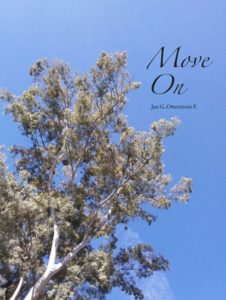 Costa-Rica-based poet Jan G. Otterstrom F. reached out to me to invite me to provide a prologue to Move On, his latest poetry collection. I was flattered that he would ask me to do that, and I was also happy to read the manuscript before publication. So I said “yes” and read the book in Montevideo over the (Southern hemisphere’s) Winter.
Costa-Rica-based poet Jan G. Otterstrom F. reached out to me to invite me to provide a prologue to Move On, his latest poetry collection. I was flattered that he would ask me to do that, and I was also happy to read the manuscript before publication. So I said “yes” and read the book in Montevideo over the (Southern hemisphere’s) Winter.
So now that it is the (Northern hemisphere’s) Winter and the book is out, I’d like to recommend it here. The best way I know to do that is by copying my foreword. So, enjoy:
I first discovered the poetry of Jan G. Otterstrom through translation. I came to him on recommendation from a fellow scholar. He described Otterstrom’s poetry as “an undiscovered, important part of Mormon literature.” I was intrigued, especially when I learned that two of his books had been published in Spanish. So I went searching for them and came across Telar, a sort of interior monologue in four parts, translated into Spanish by Julio César Llópiz Pacheco. Soon thereafter I read Suite de La Habana / Havanna Suite, a bilingual poetry collection where Otterstrom’s original poems and Llópiz Pacheco’s translations appear side by side. I have been following Otterstrom since, and so I was honored when he tapped me to provide a foreword to his latest collection: Move On.
Otterstrom is a prolific writer, and thus Move On comes as a continuation, a moving onward and forward, of a lifetime of writing poetry. It is a deeply introspective work, where the poet exposes his inner world to the reader. He does this by taking us through one year of his life, starting on April 6, 2018, and providing autobiographical reflections. For examples, the poem “Stages” discusses a recent illness for which he was treated in California. Other poems, such as “June 18, 2018,” provide snapshots of sights and places in Costa Rica, where Otterstrom makes his home. These poems contain a stream of consciousness type of quality, which is both satisfying to the reader, as ideas flow seamlessly one into another, but also challenging, as real focus is needed to fully experience the poetry.
All in all, these poems express a cry for peace, for the simpler life. Thus, there is a spiritual quality to them, sometimes subtle and sometimes front and center, as can be attested in poems such as “A Sharp Sword.” Indeed, in Move On poetry is identified as a calling, a form of revelation even. Not surprisingly, the language of scripture is weaved into the fabric of the poems in the same way that other poets echo their own artistic traditions. This introspective, spiritual approach to poetry allows Otterstrom to look back at his life and forward at eternity (“…present is / past as each second we step / into a future eternity…”). And this is one of the key contributions of this book: it reaffirms a worldview where the spiritual and the material worlds are really one which is manifest every day in simple and unexpected ways.
Another interesting feature of Move On is that it is a multilingual work. Some poems are written bilingually in English and French or Spanish, such as “April 29, 2018,” while others are served straight in Spanish, such as “Tesoros del patrimonio español,” or in French, such as “Morning sun.” These are not translations done by others but rather Otterstrom seeking to express himself in more than one language. Thus, the poet brings his inner world to the outside not just in English but in all three languages he speaks.
In short, if this is your first Otterstrom book, you are about to discover a unique Mormon poet. If you’ve read him before, you will find this collection as fulfilling as previous ones. Whatever the case may be, I trust you will enjoy this powerfully personal, spiritual, and multilingual work.

I can‘t find the book on Amazon!
Please, isn‘t there a way to purchase this besides BYU??